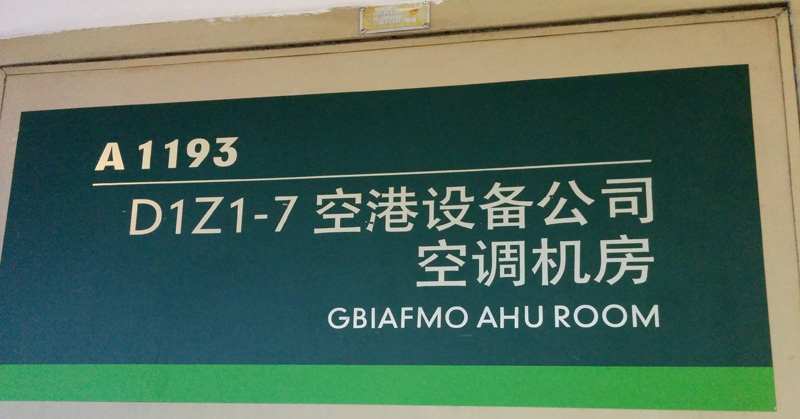GBIAFMO AHU ROOM
« previous post | next post »
Jim Breen snapped this photograph in the departure lounge at Guangzhou airport:
The next to the last line reads:
kòngtiáo jīfáng 空调机房
("air-conditioning machine room")
The first two words of the English on the sign seem completely impenetrable, but it did not take me long to locate the mysterious "AHU" in this online Chinese-English dictionary.
The dictionary doesn't tell us what "AHU" means, but I found it elsewhere as an acronym for "air handling unit".
That was the easy part.
Since "AHU" is an acronym, I assumed that "GBIAFMO" was also probably an acronym. Within seconds, I tracked it down: Guangzhou Baiyun Airport Facilities Management and Operation Company Limited (GBIAFMO), a subsidiary of Keppel Integrated Engineering Ltd (KIE), the Singapore environmental services firm.

Laura Morland said,
September 27, 2015 @ 9:58 pm
So the English on the sign is designed for that very small subset of the population who cannot read Chinese, but who know what "GBIAFMO AHU" means?
Bathrobe said,
September 27, 2015 @ 10:33 pm
Note that the Chinese name of GBIAFMO contains the trendy 空港 kōng-gǎng (literally 'air/sky port'), which is actually from Japanese.
The normal Chinese word is 机场 jīchǎng (literally 'machine place'), shortened from 飞机场 fēijī-chǎng (literally 'flying machine place').
Chris Waigl said,
September 27, 2015 @ 11:03 pm
So in a certain sense this is actually a completely error-free translation? A little bit like a sign that says SFMOMA HVAC ROOM?
Mark Mandel said,
September 28, 2015 @ 12:26 am
A certain totally senseless sense.
David Morris said,
September 28, 2015 @ 3:52 am
Is the Korean word 공항 (gong-hang) related to the Japanese, because my Korean dictionary has Chinese characters next to it (which I have no hope of reading or reproducing here)?
Victor Mair said,
September 28, 2015 @ 6:30 am
For those who are curious, the Chinese in the first line reads:
kōnggǎng shèbèi gōngsī 空港设备公司 ("airport equipment company")
Bathrobe said,
September 28, 2015 @ 7:20 am
공항 is indeed 空港. A lot of modern kanji/hanja-based vocabulary has come into Korean from Japanese.
Guy_H said,
September 28, 2015 @ 7:22 am
Minor observation, but funny how the word 空港 ("airport") has gone from old-fashioned sounding to trendy.
Gnoey said,
September 28, 2015 @ 7:50 am
As a Singaporean, and knowing that the company in question is a subsidary of a Singaporean company KIE, I am not surprised at all to see GBIAFMO. Singaporeans simply love abbreviations! We use them all the time in speech and in writing, and there is even an entire Wikipedia entry dedicated to them (https://en.wikipedia.org/wiki/List_of_Singapore_abbreviations)
"AHU Room" is a very common term. You can probably see it in many buildings in Singapore, though most people don't really know or care what "AHU" means!
@David Morris
Yes, 공항 is indeed just the Korean pronunciation of the Chinese characters 空港 ("kuukou" in Japanese).
As noted by Bathrobe, Chinese nowadays occasionally uses Japanese kanji compounds to sound "trendy", even if there are perfectly good native Chinese words for the same object or idea. For example, while the usual Chinese word for "photograph" is 相片(xiang4 pian4) , the Japanese loanword 写真 (xie3 zhen1; or "shashin" in Japanese) is sometimes used to refer to photos of good-looking entertainers. An expert in a particular skill is 高手 (gao1 shou3) in Chinese, but recently TV shows like to use the Japanese loanword 達人(da2 ren2; or "tatsujin" in Japanese; written as 达人 in Simplified Chinese) instead. The TV show "China's Got Talent" is 中国达人秀.
Bathrobe said,
September 28, 2015 @ 8:38 am
The contemporary use of 人气 for 'popular' also appears to be from Japanese.
For those interested, I have a page on the adoption of the Japanese term for 'photograph' at 写真.
Lynne said,
September 28, 2015 @ 9:33 am
I think I'm going to be "that guy", but I can't see how GBIAFMO is supposed to be an acronym. I would call it an initialism. (And I usually wouldn't bring that up, but this is Language Log.)
But yeah, that's a really obtuse translation that I can't see being much use to anyone that doesn't already know what the sign is supposed to mean.
Victor Mair said,
September 28, 2015 @ 9:58 am
1.
Is "AHU" an initialism or an acronym?
2.
WTO initialism 16,300 ghits
WTO acronym 195,000 ghits
Alyssa said,
September 28, 2015 @ 12:53 pm
Since presumably all maintenance staff at the airport will be Chinese speakers, I'd imagine the intended message of this sign for English speakers is simply: "Whatever you're looking for, it's not in this room." An impenetrable acronym gets that message across just fine, so I'd say this is a very successful translation!
David Morris said,
September 28, 2015 @ 5:29 pm
Bathrobe: Thanks for the information.
bratschegirl said,
September 30, 2015 @ 1:03 am
Every time I see this I have to remind myself that no, it does not say "GTFO."
BZ said,
October 1, 2015 @ 4:28 pm
I can't think of any abbreviation in US English that is as long as GBIAFMO, and yet not pronounceable. If I had to use it a lot I would end up coming up with a way to pronounce it, G-bia-F-mo maybe
Rodger C said,
October 2, 2015 @ 1:02 pm
I would have taken this room to be the residence of Gbiafmo Ahu, exiled president of Lower Middle Volta.